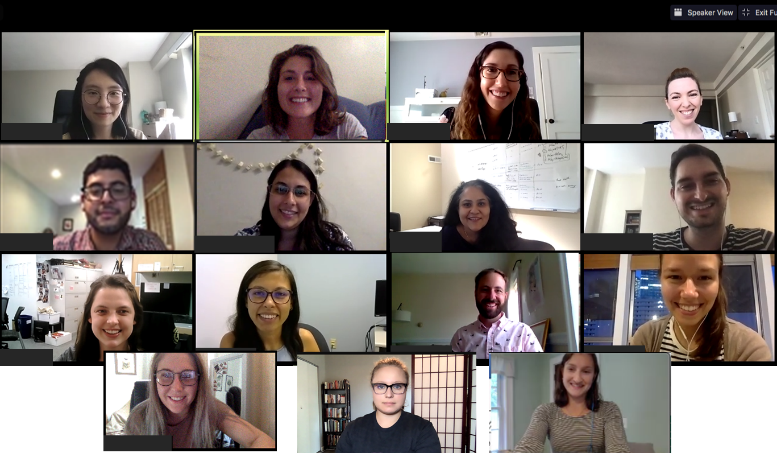Developing a Tele-Assessment Protocol for Individuals with Aphasia
Written By: Emily J. Braun, Maria Dekhtyar, and Swathi Kiran

Members of the Aphasia Research Laboratory in our current workspace
In clinically-focused research for individuals with chronic post-stroke aphasia, there can be a number of barriers to in-person participation. Some individuals do not live near a city with a research center, others have difficulty with physical mobility making regular lab visits challenging, and others prefer to have family accompany them to visits but are not able to do this because their family members are unavailable. Because of this gap between interest and participation, our colleague Dr. Claudia Peñaloza sought to adapt our research assessment and treatment protocol for virtual assessment. This included the adaptation of the Western Aphasia Battery – Revised (WAB-R) for videoconference assessment with the use of an electronic version of the stimulus book.
After the development of the protocol, we completed a study evaluating the feasibility and validity of this videoconference assessment. In the study, twenty adults with chronic aphasia completed the WAB-R both in person and via videoconference 1-2 weeks apart. At the group level, in-person vs. videoconference administrations were highly correlated. At the individual level, most participants (17/20) showed less than a five-point difference between the two administrations. In terms of feasibility, we found that with set-up assistance for using the computer, the participants were able to complete the test through tele-assessment. This protocol has allowed us to widen our scope of recruitment for research studies and achieve potentially more generalizable results as data collection is not restricted to participants who can attend regularly in-person.
We could not have foreseen the more immediate need we and others would have for reliable, standardized, telerehabilitation protocols in research and clinical practice for individuals with aphasia as a result of the COVID-19 pandemic. We are also continuing to adapt our treatment protocols for tele-administration. We hope that future work by our group and others in this area will continue to develop telerehabilitation protocols that yield equivalent results to in-person assessment and treatment in order to expand our field’s reach for the individuals we serve in research and clinical practice.
Developing and testing this protocol has also given us valuable insight into how to adapt other interactions to a virtual setting. For example, our research laboratory hosts a weekly social and conversation group (C.H.A.T.: Conversation through Health, Art, and Technology) for individuals with aphasia, which we have moved online due to the pandemic. Experiences with helping participants log in to Zoom and participate in a conversation virtually have made the transition smoother. We are happy to be able to continue serving our community members virtually.
If you are interested in learning more about our tele-assessment study, ASHA has made this work openly available here: WAB-R tele-assessment paper. Maria and Emily also served as guests on a webinar provided by Pearson detailing their recommendations for telepractice with the WAB-R: Pearson WAB-R webinar. The actual assessment materials are available through Pearson's Q-global platform.

Emily J. Braun is a speech-language pathologist and third-year doctoral student in the Department of Speech, Language & Hearing Sciences at Boston University.

Maria Dekhtyar was the Clinical Research Lab Manager in the Aphasia Research Laboratory at the time this work was completed and is now a second-year doctoral student in the Department of Psychology at the University of Texas at Austin.

Dr. Swathi Kiran is a professor in the Department of Speech, Language & Hearing Sciences in Sargent College at Boston University; Associate Dean for Research for Sargent College; and Director of the Aphasia Research Laboratory.
